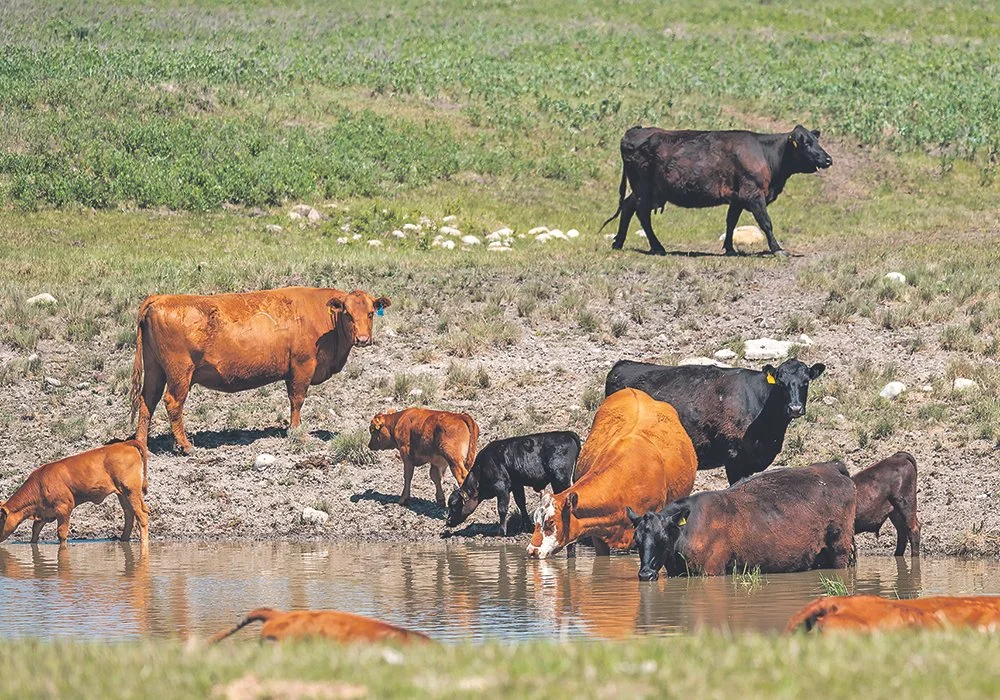As reservoir levels stabilize in southern Alberta, a consulting company says it’s crucial that all stakeholders work together. Irrigation districts in southern Alberta managed a tough growing season as drought maintains a stubborn hold and calls for maintaining co-operation between stakeholders and better water storage infrastructure continues. From the Milk River along the U.S. border to the Hay River running into the Northwest Territories, 50 water shortage advisories are currently in place across the province.
A coastal First Nation’s Guardians are ‘testing the water’ to prepare for climate change
A coastal First Nation’s Guardian team is gearing up to test the waters to try to limit the impacts of drought in their traditional territories on northeast Vancouver Island. The We Wai Kai First Nation's environmental stewards are partnering with other local groups to map and monitor wetlands, watersheds and streams on Quadra Island as summers get hotter and drier, said Guardian program manager Shane Pollard. Drought in the northeastern Vancouver Island water basin, which includes We Wai Kai territory and Quadra Island, is increasingly common.
B.C. groundwater licensing delays abound, 7 years after requirement was introduced
In July, three years after Cowichan Valley farmer Katy Ehrlich applied to get her farm's well licensed, provincial officials visited her farm. "They had an order with them that said that we had to stop diverting groundwater for commercial purposes. And we were like shocked," said Ehrlich, who had thought everything was fine with her application for a non-domestic groundwater licence, a requirement under the B.C. Water Sustainability Act (WSA).
B.C., Canada help farmers with climate adaptation, drought
B.C. farmers and ranchers can better prepare for and mitigate impacts of climate change, while continuing to support the province’s food security and a sustainable environment through funding from the governments of Canada and British Columbia. Funding is available via the Beneficial Management Practices (BMP) program. “The Government of Canada is committed to helping our agricultural producers mitigate the impacts of climate change,” said Lawrence MacAulay, federal Minister of Agriculture and Agri-Food. “This investment will offer B.C. farmers the support they need to adapt their operations to be more resilient to the impacts of climate change, while protecting food security and the environment for future generations.”
Cattle struggles deepen in Alberta
A second rural municipality in Alberta has declared an agricultural disaster because of drought this spring as beef producers head into summer, a period typically of less rain. “We haven’t seen the total effects of the drought,” said Stan Schulmeister, reeve of the County of Paintearth east of Red Deer. “But the agricultural producer that’s strictly dealing with livestock is going to find it very difficult to find feed this year because it’s almost province-wide, the damage to the hay crop and so on.”
Canadian Prairies farmers try to adapt to a warming world
Most canola crops are grown without requiring irrigation in the Prairies, the nation's agricultural heartland spanning nearly 1.8 million square kilometers (695,000 square miles). But the region is sensitive to droughts, whose frequency and severity have been steadily increasing. In this region, explains Phillip Harder, a hydrology researcher at the University of Saskatchewan, in Saskatoon, "crop production relies on water that accumulates throughout the year." In other words, snow that accumulates over winter and soaks into the ground during the spring thaw. But howling winds over fields that stretch as far as the eye can see have been blowing away much of that snow of late.
Sunshine Coast stress on the rise as temperatures heat up, water shortage threat looms again Social Sharing
Sunshine Coast brothers Gord and Geoff Sloan wrestle a 9,000-litre water tank — the size of a small car — into position behind a rural home in Sechelt, B.C., until the empty metal cavern tips into place with a resounding boom. The new owner of this massive metal tank hopes rain will fill it with enough to supply months of water for plants. The brothers' year-old business, RainCatchers, is booming as more hot, dry weather arrives after a parched spring in a region dogged by drought for the past few years.
Some farmers in B.C. able to extend harvesting while others struggle with drought
The unusual stretch of warm weather and summer-like heat is allowing some farmers in B.C. to extend their fall harvest season as crops continue to grow and yield quality produce, while others, especially in water-restricted areas, are struggling with the lack of rain. Sean Smukler, the chair of agriculture and environment at the University of British Columbia, says farmers experienced a cold and wet start to spring that delayed the growth of their crops by about three weeks, but some have been able to make up for lost time in the latter half of the season. "The crops that are well established and just need a little bit of water in this late season are probably able to take advantage of the sunny warm weather," Smukler told CBC News.
‘Bone dry or soaking wet,’ water study faces extremes
Farmers learned a lot from the real-world whiplashing experiment you could call “Farming in 2021-22.” “Make sure your dugouts are deep enough,” said Ridgeville, Man., farmer Neil Claringbould, when asked what he learned from the brutal drought of 2021, as he showed other farmers and researchers one of his new water retention dams on a stream on his land. How about 2022? “We weren’t short of grass.”
Producers experiencing water shortages in southwest Sask.
Farmers and other producers in southwest Saskatchewan are experiencing dry fall weather. The lack of rain in some areas is causing "moderate to severe on-site water shortages," according to the latest provincial crop report. "It's just setting us up again for a questionable start for next spring," Garner Deobald, the president of the Saskatchewan Stock Growers Association, said. Deobald said most places have seen below average snowfall for the last three or four years. He said the Ministry of Agriculture needs to monitor water quality.











